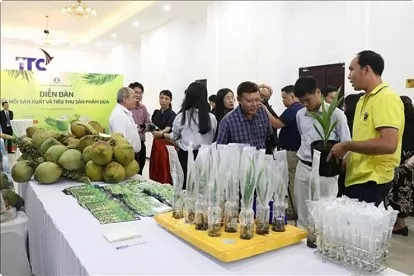
Vietnamese coconut becomes high-value export products
Latest
 |
| Delegates visit a tissue coconut culture model at the forum. (Source: VNA) |
Jointly organised by the Vietnam Agriculture Newspaper, the Ministry of Agriculture and Rural Development (MARD)'s Department of Quality, Processing and Market Development, and relevant agencies, the event served as a strategic bridge in the coconut value chain, allowing stakeholders to connect towards fully tapping cooperation opportunities together.
In her opening speech, Nguyen Thi Thanh Thuy, Director of the MARD’s Department of Science, Technology and Environment, said Vietnamese coconut is becoming a high-value export commodity, and processed coconut products are expected to increase the value of coconut cultivation and raise income for farmers.
According to statistics, 30% of coconut plantations have been certified as meeting VietGAP standards, and 30% have been granted planting area codes.
Thuy said Vietnam aims to have over 200,000 ha of coconut nationwide by 2030 with key coconut-growing regions being the Mekong Delta (about 175,000 ha) and the south-central coastal region.
Deputy Director of the Ben Tre provincial Department of Agriculture and Rural Development Huynh Quang Duc, Ben Tre is known as the "coconut capital" of Vietnam with over 80,000 ha, accounting for 88% of the total coconut area in the Mekong Delta, and nearly 42% of that nationwide. The coconut has been identified as a key crop that brings a major source of income for over 200,000 rural households in the locality.
Ben Tre now has 133 coconut cultivation areas granted with codes and 14 businesses licensed for packaging fresh coconut products for export to the Chinese market. Each year, the province earns over 350 million USD from exporting coconut per year.
The provincial Department of Agriculture and Rural Development has collaborated with agencies and local authorities to develop an organic coconut material area of over 20,700 ha. The locality has formed a value chain with eight large enterprises that use modern processing technology to produce and export organic coconut products to markets such as the US, the European Union (EU), Japan, China, Canada, and the Republic of Korea.
Coconut is one of the six key crops included in the scheme for developing key industrial crops until 2030 issued by the MARD, which sets to increase coconut plantation areas to about 195,000-210,000 ha by 2030.
Coconut exports helped Vietnam rake in 900 million USD in 2023, and the figure is expected to exceed 1 billion USD this year. Positive advancements, such as the approval of Vietnamese coconuts by the US and Europe, along with ongoing negotiations with China for official export to the country, have laid a strong foundation for expanding markets and promoting sustainable development of the industry.
The Government and the MARD have implemented numerous policies to develop the coconut industry, Deputy Director of the Department of Quality, Processing and Market Development Le Thanh Hoa said, adding that localities need to leverage these policies to support the production activities of farmers.
Meanwhile, Vietnamese businesses must have strategies to increase product prices in markets, so that the added value can be used to subsidise farmers, he noted.

























